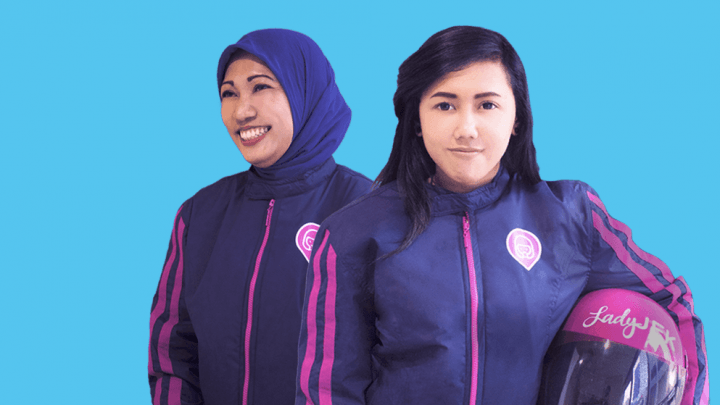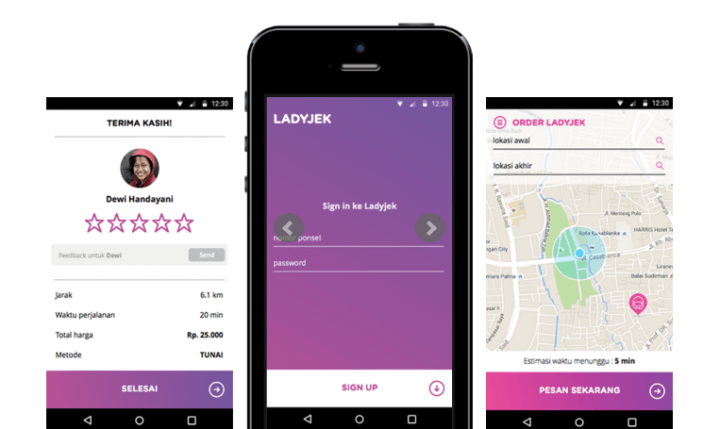
A few months ago, 22-year-old Brian Mulyadi wrapped up his college degree at Boston University and returned to his home country, Indonesia, with a business idea. Things have moved fast since then.
Brian launched a company called LadyJek – it’s an idea so absurd that I thought it was a joke when I first heard about it. Of course, Brian is serious.
LadyJek is a motorcycle ride-hailing service exclusive to women. If you’re female, you can order a motorcycle ride through the app, and the rider arriving to pick you up will also be female.
Yes, LadyJek is very similar to its bigger brothers, Go-Jek and GrabBike – both of which have become popular in Indonesia. Hitching a ride on the back of someone else’s motorcycle is a common form of transportation here. But for a bootstrapped startup to take it up with two well-established players sounds like an impossible battle. Or is it?
Brandishing pink logos, stylish striped jackets, and pink helmets, LadyJek thinks it can fill a gap the two other services aren’t addressing, which is to make motorcycle rides a viable option for women.

“I feel that there is [something women] haven’t found in current solutions,” Brian says. “They don’t have the feeling of security and comfort they expect.”
It goes for both riders and passengers. Female motorcycle riders may feel intrigued to participate in the opportunity to earn extra income by taking on passengers, but haven’t felt comfortable joining GrabBike or Go-Jek. Generally, motorcycle riding is considered men’s work. Female riders for these services have been spotted, but they are in a clear minority. Some have, probably unwillingly, turned into social media sensations – just google Gojek driver cewek (woman Gojek driver) to get an idea. Not every woman would feel comfortable with that.
On the passenger’s side, female passengers may want to hire a motorcycle ride because it’s fast and convenient, but haven’t considered it much so far, because hopping onto the back of another man’s bike is deemed inappropriate and dangerous.
LadyJek is thus not necessarily competing with Go-Jek and GrabBike, but trying to expand the market to include a group of potential riders and passengers who would have otherwise stayed away from it.
This, Brian says, is also a reason why he thinks it’s not too big a deal that LadyJek can’t keep up with the highly subsidised fares GrabBike and Go-Jek currently offer, as both compete fiercely for market leadership in the archipelago.
“We can not compete in price, but we can offer better customer service, and a secure environment for female riders and passengers,” Brian says.
It looks like he has a point. Ever since LadyJek’s launch two weeks ago, the fledgling company claims to have already signed up 1,500 female riders. The LadyJek team, which started with Brian as a single founder and his laptop, has grown to more than 40 people in a period of just a few weeks. The majority of those people handle LadyJek’s registration process for new riders, across three offices, one in West Jakarta and one each in adjacent satellite towns Bekasi and Tanggerang.
The number of rides booked is something Brian is keeping to himself for now. “We’re still observing,” he says. He does reveal that the app counts 15,000 active users, which means users having downloaded the app and created an account, including those that tried to order.

So, while we can’t yet judge how interesting the offer is from the passenger’s point of view, there’s an obvious demand from female riders. 1,500 riders in two weeks is remarkable, considering it took Go-Jek several months to get to 2,500 riders. That’s the figure the company floated in June, about half-a-year after it launched its app.
The women’s interest may have been sparked by media reports about the decent money Go-Jek and GrabBike riders can earn. According to Go-Jek co-founder Michelangelo Moran, a rider’s income averages IDR 4 million [US$290] a month, but can be much higher. That women are excluded from this opportunity irked Brian. “LadyJek offers an equal opportunity for women to earn that extra income,” he says. “I didn’t know the response would be this big.”
Go-Jek has recently expanded beyond personal transportation, and is now offering a range of services like logistics, shopping, and even ordering a masseuse or manicurist to the house.
LadyJek too is thinking of quick expansion across different service sectors. “We’re not going to launch another food delivery or courier service,” Brian assures. “We’ll focus on our strength – we’ll know exactly what women want, and turn those into services,” he explains. However, he’s not yet ready to reveal what they might be.
Curiously, LadyJek is not the only alternative two-wheel ride-hailing app to launch in recent weeks. There’s Blu-Jek, which seems to want to compete head-on with Go-Jek and GrabBike as a general motorcycle ride service, andOjesy, a service that claims to be Sharia-compliant and targets muslim women. With competitors seeking to carve out their niche, has Nadiem Makarim, the co-founder and CEO of Go-Jek, tried to get in touch with the LadyJek team? “No, not as far as I know,” says Brian, chuckling.